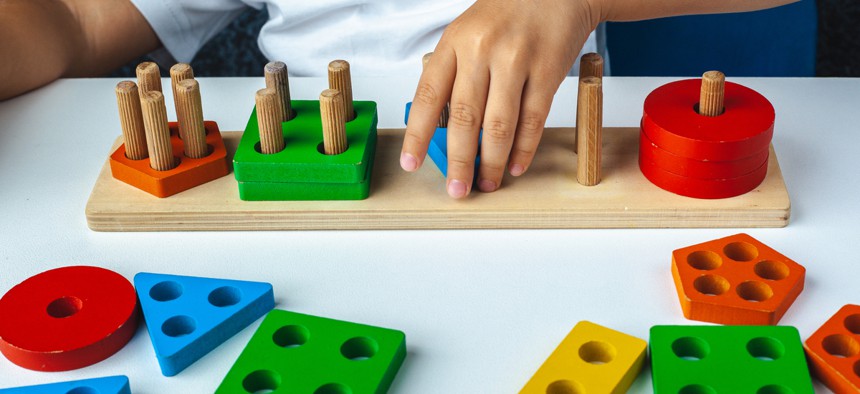How One State Seeks to Help Parents with Early Child Development

Parents can access a variety of tips for structured play, filtered by age range, location and activity. Shutterstock
In Alabama, parents can jump online to learn how to play and chat with their children in ways that encourage healthy development.
Even for dedicated and well-meaning parents, the task of shepherding a young child’s educational and emotional development can be daunting. In Alabama, new parents can now look to the state for help on how to interact with their children in ways designed to help them become better learners.
The Born Ready initiative, launched last week by the state Department of Early Childhood Education, provides parents with information and resources to help their children learn and develop at every age from birth to 5 years. Officials said the program was designed to target that age range because research shows that up to 95 percent of a child’s brain is developed in the first five years of life.
“We have always thought that we needed to do something that would provide our parents the information, knowledge and understanding of how they can truly be their child’s first and most important teacher,” said Jeana Ross, Alabama’s secretary of early childhood education. “We know that child development in those first five years is absolutely critical to that child’s success, not just academically but socially and emotionally. It will impact them for the rest of their lives.”
The tips, available for free on the program’s website, include ideas for educational songs, conversation topics and games. The material is sortable by location (activities for at home, at the park, anywhere), category (self control, focus, working with others) and “brain building basics” (chatting, follow, take turns). The site also tells parents what to look for in early childhood education, with the hope that better informed families will then look for high-quality care in their communities.
The overarching goal, Ross said, is to inspire and empower parents to help their children reach their full potential.
“There are a lot of variables involved in that personal journey that lasts a lifetime, and it can be a challenge to identify cause and effect when it comes to individual outcomes,” she said. “But every piece of research we have seen says that laying a strong foundation, with top-notch early childhood education, improves every metric later in life.”
The program, funded by a federal preschool development grant, was developed with input from dozens of state agencies and nonprofits, along with focus groups that included pediatricians, university researchers and parents. That process was “purposefully and intentionally designed to coordinate services and participants across the public and private sectors,” according to the department.
Last week’s debut was a soft rollout, Ross said, and additional programs and initiatives will be highlighted in the coming months. Officials hope to gauge the program’s success initially through user engagement, largely from data collected from the website.
“Our key performance indicators are all related to driving parental engagement,” Ross said. “We can see this through metrics like site traffic on BornReady.org and time spent on site, how many Alabama parents take the Born Ready pledge, opt-in to our email programs or engage with our social channels, and how many of our science-based tips are viewed and shared.”
Ultimately, Ross is hopeful that the program model could serve as a blueprint for other states.
“The program is specific to our state in some of the details we’re presenting at first, but actually, it’s relevant nationwide,” she said. “It’s about parents knowing what they need to know to feel confident that they’re a good parent and what that entails. That’s a message that needs to be heard.”
Kate Elizabeth Queram is a Staff Correspondent for Route Fifty and is based in Washington, D.C.
NEXT STORY: Dozens of States Want to Keep America’s Broken Climate Promise





